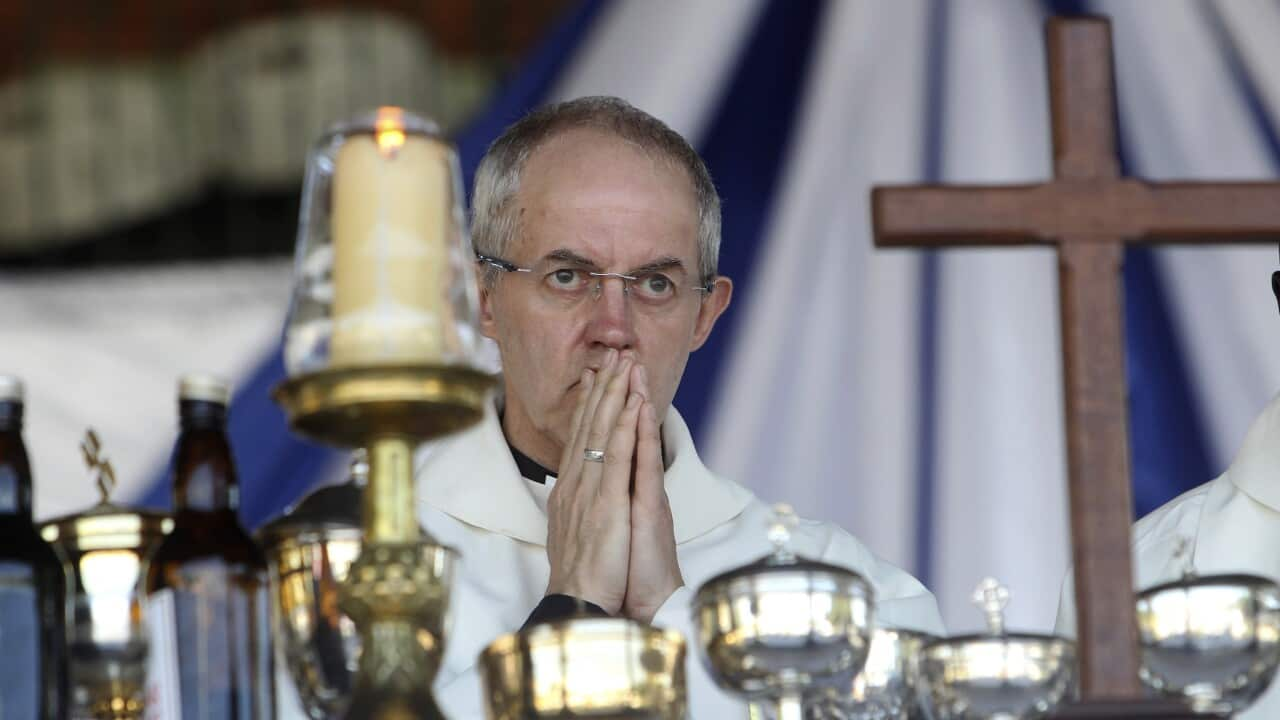TRANSCRIPT
It's an unprecedented moment for the Church of England.
The Archbishop of Canterbury Justin Welby forced to resign after covering up child abuse.
Barrister John Smyth was a volunteer at Christian summer camps who physically and sexually abused children in England, Zimbabwe and South Africa for five decades.
The abuse was revealed in 2017 by Britain's Channel 4 television station which led UK police to start an investigation.
But Smyth died in South Africa in 2018 before police could interview him.
Survivor Andrew Morse was abused by Smyth for years.
"In 1975, I met John Smyth for the first time at a Christian meeting at the school that I was at, Winchester College, and over a number of years he groomed me in to the result that he introduced sadistic beatings when I was an older teenager and through my university days, up until the point that I made an attempt on my life to stop the abuse."
The pressure on the Archbishop of Canterbury to resign had been building since last week when a church investigation found he failed to tell police about the abuse by Smyth when he became aware of it in 2013.
Members of the General Synod, the church's national assembly, started a petition calling for Mr Welby to step down, saying he had lost the confidence of his clergy.
In a statement, Mr Welby said he was stepping down to take responsibility for the scandal.
"Having sought the gracious permission of His Majesty The King, I have decided to resign as Archbishop of Canterbury. When I was informed in 2013 and told that police had been notified, I believed wrongly that an appropriate resolution would follow. It is very clear that I must take personal and institutional responsibility for the long and retraumatising period between 2013 and 2024."
And the Archbishop said he would be leaving in sorrow with victims after completing his constitutional and church responsibilities.
"I hope this decision makes clear how seriously the Church of England understands the need for change and our profound commitment to creating a safer church. As I step down I do so in sorrow with all victims and survivors of abuse. The last few days have renewed my long felt and profound sense of shame at the historic safeguarding failures of the Church of England."
For Andrew Morse, his sorrow at the abuse drove him to attempt suicide.
"The abuse itself was physical. It was caning many, many hits with a cane. But the far more damaging to me was the mental anguish that came along with it and sort of counting down from one beating to another. For my 21st birthday, John Smyth suggested or told me that I needed a special beating. And at that point, I decided that my life wasn't worth living and that I'd rather face death than another of his beatings."
And the trauma has stayed with him.
"I've struggled with PTSD and mental health problems, particularly in later life. There was a period when I felt that I was free of the abuse and free of John Smyth. But the thoughts returned and the anxiety returned and showed itself in different ways in my daily life. And I can honestly say there isn't probably a day or two that goes by without me thinking about it and whether I could have done more to expose Symth myself and therefore stop the abuse that continued in Africa."
Attending the COP 26 climate summit in Azerbaijan, UK prime minister Sir Keir Starmer was asked before Mr Welby stepped down if the Archbishop should resign.
"You know, it's a matter in the end for the church, but, I'm not going to shy away from the fact that saying these are horrific allegations and that my thoughts are with the victims in relation to it."
Now the church must begin the search for Mr Welby's successor which could take months.
David Thompson is Emeritus Professor of Modern Church History at Cambridge University.
Professor Thompson says UK Prime Minister Keir Starmer will be tasked with recommending one of two nominated appointees to King Charles to fill the vacancy.
If neither are found suitable, further recommendations could be made.
He says the resignation of an Archbishop because of a public scandal is extremely unusual.
“I certainly can't think of a precedent in the past. I wouldn't expect a precedent before 1900. It's only in the 20th century and since that it's even been possible for bishops to resign. But in the 20th century, a different system was developed to ensure a greater say from members of the church."
The Church of England investigation into Smyth found church officials first learnt of the abuse in 1982, but they actively covered it up.
The Archbishop's resignation comes against the backdrop of widespread historical sexual abuse in the Church of England.
A 2022 report found that deference to priests, taboos surrounding sexuality, and a culture supported the alleged perpetrators over the victims, helped make the Church a place where abusers could hide.
Listeners seeking support can contact Lifeline 24 hours a day on 13 11 14.













